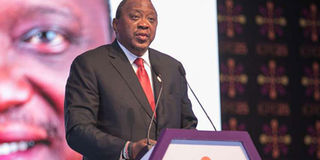Excluding youth dangerous to democracy

President Uhuru Kenyatta addresses delegates at the opening ceremony of the International Conference on Population and Development (ICPD25) at KICC on November 12, 2019. He has faced criticism for sidelining the youth in State appointments. PHOTO | PSCU
What you need to know:
- The lack of meaningful participation and representation of youth in these youth-friendly bodies is a major setback to the effective discharge of their mandate.
- It’s high time the government undertook deliberate measures to establish a criterion for appointing youth to boards of state bodies, ministries and even the private sector at all levels.
The youth are infuriated by the recent trend of appointing politicians above the retirement age to state positions at their expense yet they are the majority.
The appointments show the gulf between the people deciding policy and programmes and the beneficiaries.
The lack of meaningful representation in the relevant governance and decision-making processes defeats the Constitution’s principles of an inclusive, responsive and accountable government.
Articles 10 and 27 provide for inclusivity, equality and freedom from discrimination based of age.
Article 55 requires that the government take measures, such as affirmative action programmes, to ensure that the youth access relevant education and training, have opportunities to associate, be represented and participate in political, social, economic and other spheres of life, access employment, and are protected from harmful cultural practices and exploitation.
But the government has bred hopelessness and disillusionment among the youth, leading to their disconnection from active involvement in the electoral, democratic and governance.
EMPOWERMENT
Notably, the government has established several youth-friendly agencies and affirmative action programmes such as the Youth Enterprise Fund, Technical and Vocational Education and Training, Uwezo Fund, Access to Government Procurement Opportunities (AGPO), National Government Affirmative Action Fund, the Sports, Art and Social Development Fund, Kenya Youth Employment Opportunities Project (KYEOP), the National Youth Service (NYS), the National Employment Authority and the National Youth Council (NYC).
There are also ministries mandated with promoting youth empowerment — such as Public Service, Youth and Gender Affairs and that of Sports, Culture and Heritage. The same dedication has been reflected in some county governments.
These were established to enable youth to acquire relevant skills for employment, train on business management, access funding for their start-ups and receive government tenders, among others.
But the functionality of these agencies and programmes is a major concern.
APPOINTMENTS
A social audit report on county youth empowerment programmes for the 2017/18-2018/19 financial years shows that, in Nairobi County, only 1.2 per cent of youth have utilised AGPO.
Another report says in Trans Nzoia, the ministry in charge of youth affairs allocated Sh6 million to youth projects, but Sh21 million for “strengthening the council of elders”.
The lack of meaningful participation and representation of youth in these youth-friendly bodies is a major setback to the effective discharge of their mandate.
It’s high time the government undertook deliberate measures to establish a criterion for appointing youth to boards of state bodies, ministries and even the private sector at all levels.
The NYC, the official youth representative body with well-structured representation at the county and national levels, should be empowered to vet and nominate the candidates.
Ms Lukosi is the Nairobi Youth Senator, Youth Senate Kenya. [email protected]



